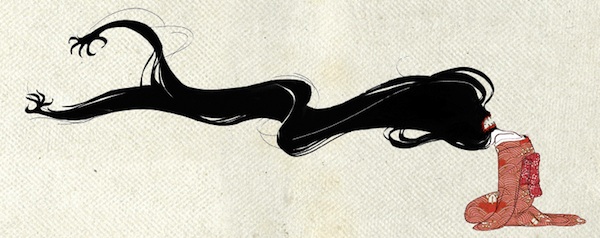According to the Japanese folklore, any beasties, creatures, spirits or supernatural monsters are all classified as Yōkai (妖怪, ghost, phantom, strange apparition). Which the word Yōkai is formed up by two kanji words for 妖 (yo) that means bewitching; mysterious; unearthly; weird; calamity” and 怪 (kai) that means “mystery; wonder; strange; apparition; suspicious”. To combine both words up, the better translation of Yōkai would be “mysterious phenomena”. (Davission, 2012).

(By: http://oddsendsbox.deviantart.com)
Regarding to Mizuki Shigeru, a senior Japanese manga cartoonist based on hyakumonogatari.com states that the word Yōkai could be break down into 4 sub-categories that are Kaiju (monster), Choshizen (supernatural), Yurei (ghost, spirit) and finally, Obake (shape-shifter) (Davission, 2012).
“There are a large number of Yōkai who were originally human beings, but latterly transformed into something horrific and grotesque usually during an extremely emotional state” (gs-mikami.wikia.com, n.d.) Futakuchi-onna (二口女 or “two-mouthed woman”) is one of the very common Yōkai in the Japanese folklore. Futakuchi-onna can be counted as obake or the shape-shifter since she is a woman with an extra mouth on the back of her head beneath the hair. Another reason, which classified Futakuchi-onna as a obake is it will appear just as a regular woman until her secret is reveled (the shapeshifter in human formed is called Henge). “In the back of their skulls, buried beneath of long, thick hair is a second mouth, with large, fat lips, and full of teeth. This second mouth is ravenous, and uses long strands of hair like tentacles to gorge itself on any food it can find” (Yokai.com, 2013)
No one knows its origin, but according to Yokai.com, it’s stated that Futakuchi-onna are most often thought to be shape-shifted yama-uba (a monstrous crone that got the second mouth hidden under her hair whose took part in ‘Sakata no Kintoki’) posing as young woman. However, in every story, Futakuchi-onna is used as a punishment on a covetous man or woman for wickedness and extreme parsimony (Yokai.com, 2013).
One of the most common stories of Futakuchi-onna is; in a small rural village in Fukushima there lived an ungenerous miser who could not bear paying for food to support family and decided to live alone. One day, he met a woman who did not eat anything at all, and he instantly took her for his wife, since she never ate a thing and was still a hard worker, which sometimes thrilled the miser. However, his stores rice was strangely decreasing day by day and he could not figure out why, since he never saw his wife eat.
One day, the miser falsely / pretended to leave for work, but instead planned to spy on his new wife. She untied her hair, revealing a second mouth on the back of her head, complete with terrible lips and frightful teeth. Her hair reached out with tentacle-like stalks and began to scoop rice balls into the mouth on her back head that cooed out with pleasure, raspy voice.After the miser saw what was happened, he was horrified and determined to divorce his new wife. However the wife trapped him in a bathtub and carried it off, all the way to the mountains. Luckily, the miser managed to escape and hid in a heavily scented lily marsh, where the Futakuchi-onna could not find him (Yokai.com, 2013).
There is also another aspect of the Futakuchi-onna tales where there is a stepmother who always fed / gave plenty of food to her own daughter but ignore her stepdaughter. The stepdaughter became sick overtime and finally died. Forty-nine days later, the evil stepmother was afflicted with a terrible headache. “The back of her head split open, and lips, and teeth, and a tongue formed. The new mouth ached with debilitating pain until it was fed, and it shrieked in the voice of the dead stepdaughter” (Yokai.com , 2013). And at the end, the wicked stepmother always had to feed both of her mouths, and always felt the hunger pangs of the passed away stepdaughter.
The interesting point is, in the second story, it’s also mentioned in the specific number (forty-nine) inside the folklore, which in Japanese culture, there is a belief that number 4 (in Chinese) sounds quite similar to the world of death and also sound familiar and identical to the word ‘death’ in many cultures such as Korean, Japanese and also in Vietnamese. Number 9 is also skipped in some contexts, especially hospital because the sound is being associated with the word ‘kurushimu’ which means suffering. The number 49 in Japanese culture is considered to be an especially unlucky number since it is evocative of the phrase “shinu made kurushimu” (死ぬまで苦しむ), which means, “to suffer until death”. (Scott, 2013)
Many people, whose don’t know the origin of Futakuchi-onna, frequently imagined her as a beautiful girl with living long black hair, unfortunately, for me, Futakuchi-onna is one of the most creepiest Yōkai in Japanese folklore since it’s come in shape-shifted form and hide her true self beneath the black beautiful hair. But as the time passed, pastly, Futakuchi-onna is believe to be appeared against one that extremely stingy or extremely parsimony in the shape of young girl but in popular culture, Futakuchi-Onna seems to be not so scary or creepy anymore. It appeared in many medias such as features in the 2005 movie “The Great Yokai War”, in the video game such as “Skullgirls”, “The Last Blade”, “Ragnarok online”, etc. or even is the originated of the character Mawile in The Pokemon.
References:
Davission Z. (October 26, 2012). What Does Yokai Mean In English. Retrieved from: http://hyakumonogatari.com/2012/10/26/what-does-yokai-mean-in-english/
Gs-mikami.wikia.com (n.d.). Yōkai. Retrieved from: http://gs-mikami.wikia.com/wiki/Yōkai
Scott G. (June, 2013). The number of death: lucky and unlucky numbers in Japan. Retrieved from: http://japanese.lingualift.com/blog/lucky-unlucky-numbers-japan/
Wikipedia (April 20, 2014). Futakuchi-Onna. Retrieved from: http://en.wikipedia.org/wiki/Futakuchi-onna
Yokai.com (2013). FUTA-KUCHI-ONNA. Retrieved from: http://yokai.com/futakuchionna/








